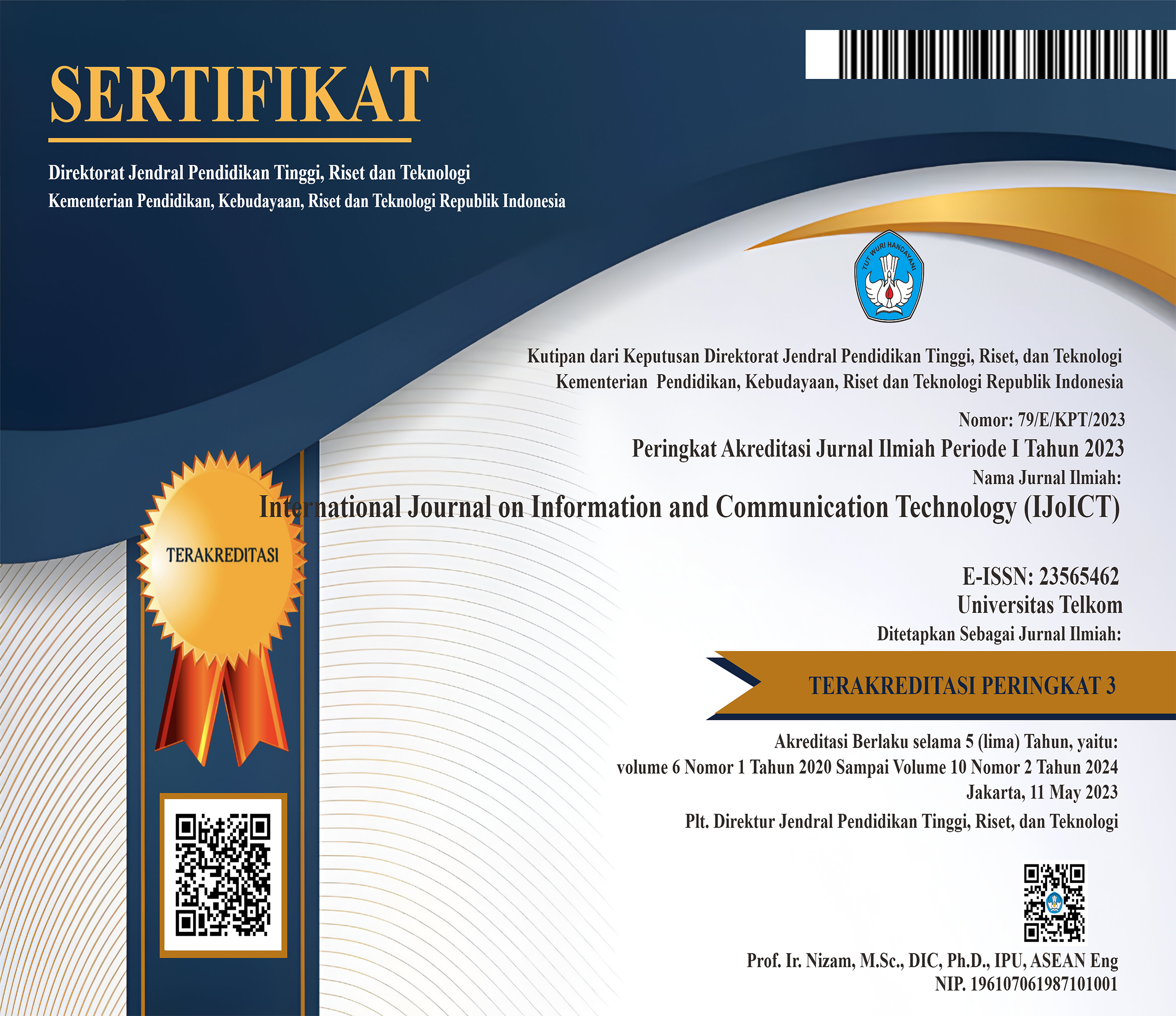Sentiment Analysis of Tourist Attraction Review from TripAdvisor Using CNN and LSTM
DOI:
https://doi.org/10.21108/ijoict.v9i1.756Keywords:
Sentiment Analysis, Tourist Attraction, Deep Learning, CNN, LSTMAbstract
The tourism sector has an important role in driving the economy. To find out the positive or negative responses of tourists, one of them is grouping through sentiment analysis using deep learning. The data used the tourist attraction dataset from TripAdvisor from several categories such as water and amusement park, nature, and museum. The methods used in this research are convolutional neural network (CNN) and long short-term memory (LSTM). In addition, Word2vec for feature extraction and Synthetic Minority Over-sampling (SMOTE) for handling imbalanced datasets will be used for this research. There are several scenarios used to perform sentiment analysis, with early stopping and with hyperparameter tuning using random search. The highest performance obtained on water and amusement park, nature, and museum category data is 83%, 97%, and 88% respectively for accuracy and 91%, 92%, and 93% respectively for F1-score. For the use of sentiment analysis methods, CNN can perform with the highest F1-score and LSTM can perform with the highest accuracy.
Downloads
References
[2] B. A. Utami and A. Kafabih, “SEKTOR PARIWISATA INDONESIA DI TENGAH PANDEMI COVID 19,†Jurnal Dinamika Ekonomi Pembangunan, vol. 4, no. 1, 2021, doi: 10.33005/jdep.v4i1.198.
[3] J. Nurvania, Jondri, and K. M. Lhaksamana, “Analisis Sentimen Pada Ulasan di TripAdvisor Menggunakan Metode Long Short-Term Memory (LSTM),†in e-Proceeding of Engineering, 2021.
[4] A. A. Arifiyanti, M. F. Pandji, and B. Utomo, “Analisis Sentimen Ulasan Pengunjung Objek Wisata Gunung Bromo pada Situs Tripadvisor,†Explore: Jurnal Sistem Informasi dan Telematika, vol. 13, no. 1, 2022, doi: 10.36448/jsit.v13i1.2539.
[5] A. Rifa’i, H. Sujaini, and D. Prawira, “Sentiment Analysis Objek Wisata Kalimantan Barat Pada Google Maps Menggunakan Metode Naive Bayes,†Jurnal Edukasi dan Penelitian Informatika (JEPIN), vol. 7, no. 3, 2021, doi: 10.26418/jp.v7i3.48132.
[6] R. Naquitasia, D. H. Fudholi, and L. Iswari, “Analisis Sentimen Berbasis Aspek pada Wisata Halal dengan Metode Deep Learning,†Jurnal Teknoinfo, vol. 16, no. 2, 2022, doi: 10.33365/jti.v16i2.1516.
[7] D. I. Af’idah, R. Kusumaningrum, and B. Surarso, “Long short term memory convolutional neural network for Indonesian sentiment analysis towards touristic destination reviews,†in Proceedings - 2020 International Seminar on Application for Technology of Information and Communication: IT Challenges for Sustainability, Scalability, and Security in the Age of Digital Disruption, iSemantic 2020, 2020. doi: 10.1109/iSemantic50169.2020.9234210.
[8] Y. W. Syaifudin and R. A. Irawan, “IMPLEMENTASI ANALISIS CLUSTERING DAN SENTIMEN DATA TWITTER PADA OPINI WISATA PANTAI MENGGUNAKAN METODE K-MEANS,†Jurnal Informatika Polinema, vol. 4, no. 3, 2018, doi: 10.33795/jip.v4i3.205.
[9] P. S. M. Suryani, L. Linawati, and K. O. Saputra, “Penggunaan Metode Naïve Bayes Classifier pada Analisis Sentimen Facebook Berbahasa Indonesia,†Majalah Ilmiah Teknologi Elektro, vol. 18, no. 1, 2019, doi: 10.24843/mite.2019.v18i01.p22.
[10] I. P. Prasista Bestari, I. G. A. O. Suryawardani, and A. Suryawan Wiranatha, “Respon terhadap Otentisitas: Tanggapan Wisatawan Asing terhadap Unsur-unsur Budaya dalam Tiga Hotel Internasional di Bali,†Jurnal Kajian Bali (Journal of Bali Studies), vol. 10, no. 1, 2020, doi: 10.24843/jkb.2020.v10.i01.p07.
[11] L. Alzubaidi et al., “Review of deep learning: concepts, CNN architectures, challenges, applications, future directions,†J Big Data, vol. 8, no. 1, 2021, doi: 10.1186/s40537-021-00444-8.
[12] Rayhan Rahmanda and Erwin Budi Setiawan, “Word2Vec on Sentiment Analysis with Synthetic Minority Oversampling Technique and Boosting Algorithm,†Jurnal RESTI (Rekayasa Sistem dan Teknologi Informasi), vol. 6, no. 4, 2022, doi: 10.29207/resti.v6i4.4186.
[13] Siti Khomsah, Rima Dias Ramadhani, and Sena Wijaya, “The Accuracy Comparison Between Word2Vec and FastText On Sentiment Analysis of Hotel Reviews,†Jurnal RESTI (Rekayasa Sistem dan Teknologi Informasi), vol. 6, no. 3, 2022, doi: 10.29207/resti.v6i3.3711.
[14] B. U. Manalu, Tulus, and S. Efendi, “Deep learning performance in sentiment analysis,†in 2020 4th International Conference on Electrical, Telecommunication and Computer Engineering, ELTICOM 2020 - Proceedings, 2020. doi: 10.1109/ELTICOM50775.2020.9230488.
[15] J. Bergstra and Y. Bengio, “Random search for hyper-parameter optimization,†Journal of Machine Learning Research, vol. 13, 2012.
Downloads
Published
How to Cite
Issue
Section
License
Manuscript submitted to IJoICT has to be an original work of the author(s), contains no element of plagiarism, and has never been published or is not being considered for publication in other journals. Author(s) shall agree to assign all copyright of published article to IJoICT. Requests related to future re-use and re-publication of major or substantial parts of the article must be consulted with the editors of IJoICT.








.png)

.jpg)




